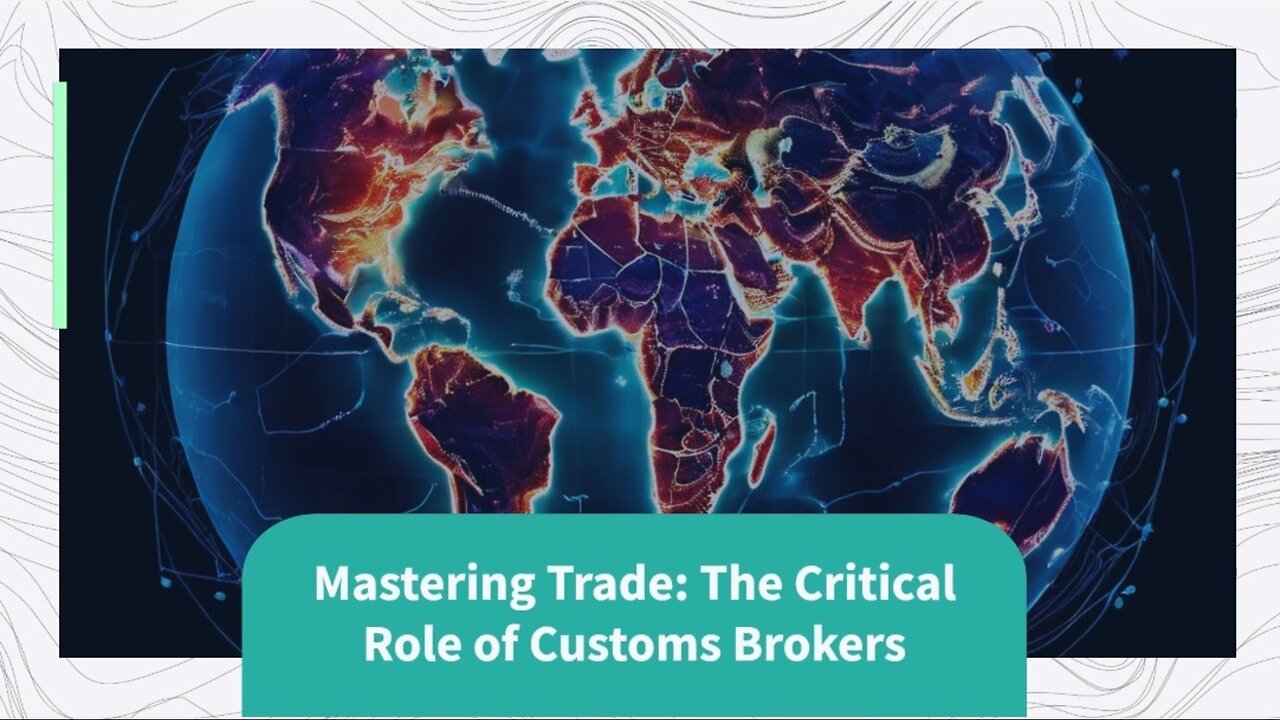Premium Only Content

Unlocking the Power of Customs Brokers: Ensuring Compliance and Gaining Insights
ISF Template | 562-453-7357 | isf@isftemplate.com | www.isftemplate.com
Customs brokers play a vital role in supporting international trade by ensuring compliance with customs regulations and conducting data analysis. Customs compliance refers to adhering to the laws, regulations, and requirements set by customs authorities. This includes accurately completing customs documentation, adhering to tariff classifications, obtaining necessary permits and licenses, and fulfilling other customs formalities.
A customs broker acts as a facilitator between importers, exporters, and customs authorities. Their expertise in understanding customs rules, regulations, and procedures makes them invaluable assets to businesses engaged in international trade. They assist with customs documentation and filing, ensuring accurate and timely submission to minimize the risk of delays or non-compliance.
In terms of tariff classification, customs brokers assign the correct Harmonized System (HS) code to goods, determining the applicable customs duties and taxes. Their knowledge and expertise ensure compliance with customs regulations while maximizing cost savings for importers.
Customs brokers also utilize tools and systems to analyze trade data. By analyzing import and export patterns, they can identify trends, assess compliance risks, and optimize supply chain operations. These insights help importers and exporters make informed decisions, streamline processes, and ensure compliance with customs regulations.
Filing the Importer Security Filing (ISF) is another important responsibility of customs brokers. ISF is part of the Customs-Trade Partnership Against Terrorism (C-TPAT) program and requires the submission of vital information about imported goods before their departure. Customs brokers accurately file this data, helping prevent security risks and expedite the customs clearance process.
Furthermore, customs brokers provide consultation and guidance, staying up-to-date with ever-evolving customs regulations. They educate importers and exporters on compliance requirements and best practices, enabling businesses to focus on their core operations while ensuring smooth customs processes and mitigating risks.
In summary, customs brokers play a critical role in customs compliance and data analysis. They facilitate international trade, ensure compliance with customs regulations, and provide valuable insights through data analysis. By partnering with a customs broker, businesses can navigate the complexities of international trade, ensure smooth customs processes, and focus on their core operations.
#CustomsCompliance
#CustomsBrokerRole
#InternationalTrade
#DataAnalysisInsights
#SmoothCustomsProcesses
#ComplianceConsultation
#GlobalTradeExpertise
#CustomsRegulations
#SupplyChainOptimization
#TradeDataAnalysis
Video Disclaimer Here: This video is designed for education and is unaffiliated with US government bodies.
00:15 - Customs brokers play a vital role in ensuring customs compliance and data analysis for import and export transactions.
00:40 - They assist in completing customs documentation, adhering to tariff classifications, and applying for necessary permits and licenses.
02:29 - Customs brokers provide valuable insights through data analysis, identifying trends, assessing compliance risks, and optimizing supply chain operations.
02:58 - They also play a crucial role in filing the Importer Security Filing (ISF) to prevent security risks and expedite the customs clearance process.
"
-
 DVR
DVR
Kim Iversen
3 days agoShe Predicted Putin Would Invade Ukraine – What Happens Next Is Terrifying | Rebekah Koffler
34.8K52 -
 1:04:51
1:04:51
Bright Insight
2 hours agoWhat I Didn't Say to Joe Rogan on his Podcast
33.7K15 -
 1:05:52
1:05:52
Havoc
3 hours agoThankful | Stuck Off the Realness Ep. 21
15.6K1 -
 2:05:40
2:05:40
Roseanne Barr
6 hours ago $41.95 earnedThe Perverse Reverse | The Roseanne Barr Podcast #76
77.9K131 -
 LIVE
LIVE
Flyover Conservatives
20 hours agoThink Texas and Florida are the Best? Think Again… - Lt. Governor Matt Pinnell; Leaky Gut, Dyslexia, ADHD, Eye Connection - Dr. Troy Spurrill | FOC Show
806 watching -
 35:40
35:40
TheTapeLibrary
14 hours ago $1.44 earnedThe Priest Murders & The Mystery of William Toomey
8.31K4 -
 1:29:16
1:29:16
Adam Does Movies
3 hours ago $1.28 earnedAwful New Christmas Movies! - Dear Santa - Our Little Secret - Nutcrackers - LIVE!
13.8K -
 3:16:05
3:16:05
Nerdrotic
7 hours ago $25.82 earnedWoke Killed Comedy, Hollywood Infighting, Girlboss Rohirrim | Friday Night Tights 330 w/ It'sAGundam
104K13 -
 1:16:08
1:16:08
Edge of Wonder
6 hours agoThe Maya Worshiped Turkeys, Bizarre Thanksgiving Facts & Weird News
17.3K1 -
 1:10:47
1:10:47
Sarah Westall
6 hours agoARPANET and Who Really Invented Blockchain: Reconstructing Reality w/ Bryan Ferre
22.7K1